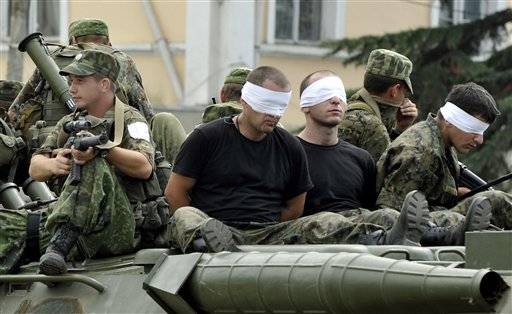Russian soldiers take prisoners in Georgia port

Georgians with their eyes covered sit atop of a Russian armored personnel carrier while being detained by Russian troops in the Black Sea port city of Poti, western Georgia on Tuesday. Russian troops entered the port of Poti on Tuesday, to detain people and to loot U.S. military equipment left behind after a joint Georgian, US military exercise. The movements of Russian forces in Georgia raised questions about whether Russia was fulfilling its side of the cease-fire intended to end the short but intense fighting between Georgians, Russians and its allies. Photo: The Associated Press/Bela Szandelszky
August 18, 2008
POTI, Georgia — Russian soldiers took about 20 Georgians in military uniform prisoner at a key Black Sea port in western Georgia on Tuesday, blindfolding them and holding them at gunpoint, and commandeered American Humvees awaiting shipment back to the United States.
The move came as a small column of Russian tanks and armored vehicles left the strategic city of Gori in the first sign of a Russian pullback of troops from Georgia after a cease-fire intended to end fighting that reignited Cold War tensions.
The two countries on Tuesday also exchanged prisoners. However, Russian soldiers also seized Georgians in Poti — the country’s key oil port city — and commandeered four U.S. Humvees that had been used in U.S.-Georgian military exercises.
It was the latest example of Russia still demonstrating its military prowess, leaving Georgians to wonder if Russia planned an extended military occupation or was still inflicting punishment before adhering to a promised troop withdrawal.
At an emergency meeting in Brussels, Secretary of State Condoleezza Rice and her 25 NATO counterparts demanded that Russia immediately withdraw its troops from Georgia, a U.S. ally that wants to join NATO.
“It is time for the Russian president to keep his word to withdraw Russian forces,” Rice told a news conference.
Russian Foreign Minister Sergey Lavrov lashed back, telling a hastily gathered news conference that the alliance was supporting an aggressive Georgia.
NATO “is trying to make a victim of the aggressor, to absolve of guilt a criminal regime, to save a collapsed regime; and is taking a course to rearm the current leaders of Georgia,” Lavrov said.
Russian President Dmitry Medvedev told French President Nicolas Sarkozy by phone Tuesday that Russian troops will withdraw from most of Georgia by Friday, the Kremlin said — some to Russia, others to South Ossetia and a surrounding “security zone” set in 1999.
In Poti, Russian forces blocked access to the city’s naval and commercial ports on Tuesday morning and towed the missile boat Dioskuria, one of the navy’s most sophisticated vessels, out of sight of observers. A loud explosion was heard minutes later. Georgian Interior Ministry spokesman Shote Utiashvili said the Russian military blew up the Dioskuria.
Several hours later, an Associated Press photographer saw Russian trucks and armored personnel carriers leaving the port with about 20 blindfolded and handcuffed men riding on them.
Poti Mayor Vano Taginadze said the Russians seized 22 military and police troops because the Georgians refused to let Russian armored vehicles enter the port. The Georgians were taken to the nearby Senaki military base, now controlled by Russia, where Taginadze was told they would be released Wednesday.
Defense Ministry spokeswoman Nana Ioseliani said eight servicemen detained trying to guard the port were being held. Utiashvili initially said those detained were police and had been released, but later referred questions to the Defense Ministry.
Pentagon spokesman Bryan Whitman said officials were looking into the reported theft of the Humvees. Georgian Deputy Defense Minister Batu Kutelia said Russian forces seized the vehicles.
The deputy head of Russia’s general staff, Col. Gen. Anatoly Nogovitsyn, justified previous seizures of Georgian soldiers as necessary to crack down on soldiers who were “out of any kind of control … acting without command.”
An AP television crew has seen Russian troops in and around Poti all week, with local port officials saying the Russians had destroyed radar, boats and other Coast Guard equipment there.
A Georgian official also said Russians were slowing down food aid shipments to Poti.
“Right now there are Russian soldiers and tanks at Poti,” Georgian Finance Minister Nika Gilavri said. “They want to open every single container” and inspect them.
Russian troops last week drove Georgian forces out of South Ossetia, where Georgia on Aug. 7 launched a heavy artillery barrage in the separatist Georgian province with close ties to Russia. Fighting also has flared in a second Russian-backed separatist region, Abkhazia.
The short war has driven tensions between Russia and the West to some of their highest levels since the 1991 breakup of the Soviet Union.
Tensions also have flared between Ukraine and Russia amid fears that Moscow might next set sights on Ukraine, another ex-Soviet republic whose government is seeking NATO membership.
The two countries sparred Tuesday over Russia’s use of naval base in the port of Sevastopol, which it is renting from Ukraine. The Kremlin has made it clear it wants the Russian ships to remain in Sevastopol even when the current lease agreement expires in 2017.
Ukraine’s pro-Western President, Victor Yushchenko, sided with Georgia in its conflict with Russia and moved to restrict the movement of Russian ships in the port, saying the vessels’ movements were subject to Kiev’s approval.
Ukraine’s foreign minister, Volodymyr Ohryzko, later sought to cool tensions and said that Ukraine will not physically prevent Russian ships from entering and leaving the naval base.
Meanwhile in central Georgia, a small column of Russian tanks and armored vehicles left Gori, and a Russian officer said they were heading back to South Ossetia and then Russia. Col. Igor Konoshenkov, a Russian military officer at the scene, gave no timetable for when the unit would reach Russia.
But other Russian troops and military vehicles remained in and around Gori following the pullout. A cease-fire requires both Georgia and Russia to return to positions held before the fighting began.
“It didn’t take them really three or four days to get into Georgia, and it really shouldn’t take them three or four days to get out,” Gordon Johndroe, a spokesman for the National Security Council, told reporters in Crawford, Texas, where President Bush is spending time at his ranch.
“It needs to happen faster; that’s what they’ve agreed to,” Johndroe said.
Russia’s foreign minister called a snap news conference in Moscow to respond to Tuesday’s remarks by NATO Secretary-General Jaap de Hoop Scheffer, who accused Russia of occupying Georgia and said “there can be no business as normal under the current circumstances.”
Despite Medvedev’s pledge, there were signs Russia could leave troops deep in Georgia longer.
Lavrov said Russian withdrawal depended “first of all, on the return of Georgian troops” to their permanent bases.
“This still hasn’t happened. Every day several episodes still occur when our servicemen detain Georgian troops” who haven’t returned to their bases as agreed, he said.
Georgian television showed footage of a tense standoff at a military training base in northwestern Georgia, where Russian troops tried to enter but were turned away by Georgia police. There was no violence, but the report said the Russians threatened to return and destroy the base if they were not allowed in.
Also Tuesday, Russia and Georgia exchanged 20 prisoners of war in an effort to reduce tensions. Two Russian military helicopters landed in Igoeti, where Georgian Security Council head Alexander Lomaia told reporters that 15 Georgians and five Russians were exchanged. “It went smoothly,” he said. The operation also witnessed by Russian Maj. Gen. Vyacheslav Borisov, who commands troops in the area.
Associated Press writers Mike Eckel in Gori and Igoeti, Georgia; Christopher Torchia in Igoeti; Misha Dzhindzhikhashvili and Matti Friedman in Tbilisi, Georgia; Dmitry Lovetsky in Ruisi, Georgia; David Nowak, Jim Heintz, Steve Gutterman and Jill Lawless in Moscow; Olga Bondaruk in Kiev, Ukraine; and Paul Ames in Brussels, Belgium contributed to this report.






